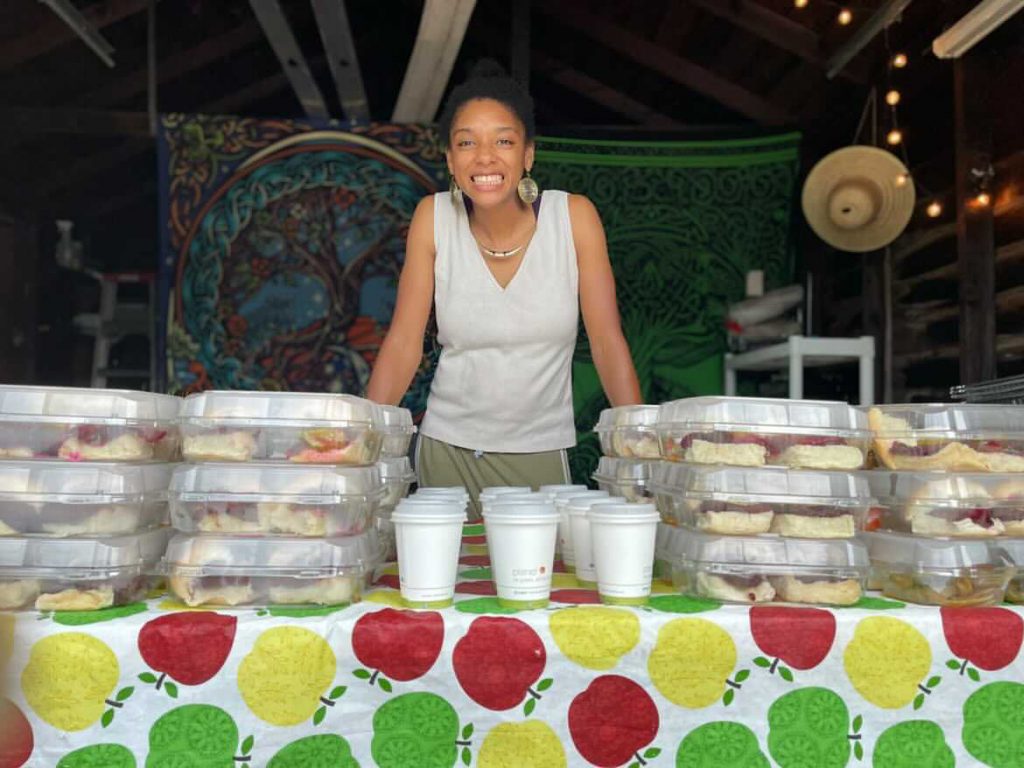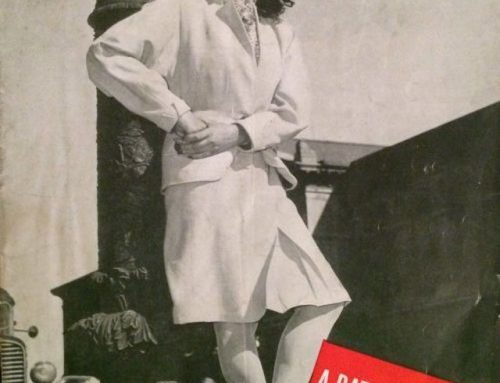Detroit’s Black-owned food businesses thrive through networks of collaboration and support
By Randiah Green
This story is part of a series on just energy futures in Detroit, produced in partnership with Planet Detroit and supported by the Solutions Journalism Network. See parts one and two at the links.
On a block of Wilshire Drive in Detroit, where there are more vacant houses than residents, Rivendell Gardens sits beaming with flowers, collard greens, and basil sprouting in neat rows. Laughter from the backyard pours out into the street in the Eastside neighborhood. It’s time for Sunday dinner and the community has gathered for a vegan feast featuring produce from Black-operated farms in Detroit.
These Sunday dinners are hosted by Rivendell Gardens, Deeply Rooted Produce, and several vegan chefs who provide the weekly meals on a donation basis. Everyone has a seat at the table whether you’ve got $1 in your pocket or $20. This week, Chef Alexandrea, owner of catering business Mag Creates, is serving heaping plates of vegan lasagna, sea moss muffins, and sauteed green beans.
Eighty percent of the ingredients that she uses in her cooking are from local sources. The green beans were harvested from Rivendell Gardens that morning. She uses vegetables from Deeply Rooted Produce whenever possible and gets spices from MoorHerbs, a Black-owned holistic food store. She also sells packaged meals at Pillar and Pride, a health and wellness shop that partners with Black entrepreneurs to sell their products.
This is what Detroit’s ecosystem of Black-owned food businesses looks like. Communities of color have historically been plagued by a lack of access to both nutritious food and resources to build their own businesses. This lapse in food sovereignty has led many Black entrepreneurs to a DIY approach within their community where they work together to build each other up. “We are showing our community that cooperative economics and food sovereignty is key,” Chef Alexandrea said. “We are taught not to trust or believe in ourselves or our communities. Once we transform our beliefs into those that are more self-serving and rooted in abundance, we can do anything we put our minds to…We all have a purpose, and if we don’t fulfill that purpose, we are doing ourselves and the world a disservice.”
On the other hand, it can be challenging to start a small business right now, especially if you don’t know where to begin. One of the resources available to farmers who want to start selling their produce is the Grown in Detroit program through local non-profit Keep Growing Detroit. Grown in Detroit allows farmers to sell their produce at KGD’s Eastern Market stand and online store. “Grown in Detroit is for somebody who wants to take their garden to the next level and be an entrepreneur,” Danielle Daguio, Fundraising and Data Specialist for KGD said. “You don’t have to have a farm, oftentimes it’s just people who are growing in their backyard. All of these growers don’t have an agriculture or business degree. Can you produce five units of cherry tomatoes by Wednesday? Yes? Okay, cool.”
It’s a sustainable ecosystem of naturally grown produce generating revenue that’s circulated within Detroit. The program takes care of all the logistics, marketing, and licensing, so sellers can just focus on growing quality produce. And the farmers get to keep one hundred percent of the profits. KGD also provides growers with seeds, transplants, support, and classes through their Garden Resource Program. This year, seventeen of the program’s twenty-six active growers are Black or people of color, making up sixty-five percent of Grown in Detroit’s revenue from the Eastern Market stand and online shop. In 2020, BIPOC growers who sold with Grown in Detroit accounted for $7,777 of the program’s total sales. More than half of KGD’s employees are also people of color.
Other Black-owned businesses in the restaurant sphere, however, have been met with challenges finding funding and securing their buildings. When Quiana “Que” Broden set out to open The Kitchen By Cooking With Que in the New Center neighborhood, she was denied funding by several investors who didn’t believe in her vision. Why would she open a healthy restaurant in the middle of the hood? How could a young Black woman with no culinary degree, money, or credit run a profitable business? “[An investor] told me it would be smarter to open a dialysis center because no one wants to eat healthy and I wouldn’t succeed. They backed out,” she said. “I had people offering me money to open in Rochester Hills and Birmingham, but not in Detroit, because the hood don’t want to be healthy.”

The Kitchen by Cooking with Que. Photo courtesy The Kitchen.
Broden opened her restaurant after changing her diet to combat Stage 4 Sarcoidosis, which was affecting her immune system. She adopted a plant-based diet and after sixty days her symptoms—including rashes and a cough she says made her sound like she was “smoking twenty packs of cigarettes a day”—were gone. After realizing the value of simply eating healthier, she was frustrated with how difficult it was to find nutritious food in Detroit.
Broden decided to open The Kitchen By Cooking with Que to share her knowledge with others. She started in 2015, posting photos of her nutritious meals on Facebook. When she realized how many people were interested in healthy living, she launched a website where she would post recipes. Then she started a cooking channel on YouTube, and the calls for her to teach cooking classes started flooding in—all while Que was still working as a mortgage broker. “Corporations were calling me out of the blue asking me to come teach their employees how to eat to live,” she said. “I would go and teach classes during my lunch break from 2017 to 2019, and finally quit my job on May 3, 2019. I opened the doors to my restaurant on June 3, 2019.”
When it came to actually securing a building and getting ready to open, Que didn’t let doubters sway her. Instead, she got “a degree from Google University” and searched “funding in Detroit” to find microlenders and nonprofits to help get her business going. That’s how she discovered Motor City Match, a program that helps small businesses acquire property through grants, loans, and business counseling.
Motor City Match is funded through the U.S. Department of Housing and Urban Development’s Community Development Block Grant which is administered through the Economic Development Corporation of the City of Detroit. It also partners with several local lenders and investors to provide business and construction loans. Since its inception in 2015, Motor City Match has awarded more than $8 million in grant money to around fourteen hundred small businesses, according to their website. Of those, eighty-one percent are minority-owned businesses, seventy-one percent are owned by women, and sixty-four percent are owned by Detroit residents.
Support independent, context-driven regional writing.
Broden applied for Motor City Match in 2016, 2017, and 2018. Eventually, in 2018 she was awarded $60,000. Soon, she was able to connect with organizations like the Detroit Development Fund, which gave her a loan for $100,000; Invest Detroit, which awarded her $300,000; and Michigan Women Forward, which gave her around $2,500. “Every time you apply and you don’t win, you ask ‘what can I do?’ They told me about the Color Fund at Bank of America and other resources. They told me I needed to write a better business plan, so I did,” she said. “All you gotta do is get in. All the nonprofits in Detroit have a mailing list, so once you get in with one, it opens up other opportunities.”
Godwin Ihentuge, owner of Yum Village, is also a Motor City Match grant recipient. His restaurant is down the street from The Kitchen by Cooking with Que. Ihentuge’s experience mirrors Broden’s—he applied several times before receiving a $50,000 grant in 2018 to open his brick and mortar. Prior to that, he operated Yum Village as a pop-up food truck which he took out a loan from family members to purchase. He said that grants are crucial for Black business owners who may not have generational wealth to lean on, but they don’t necessarily level the playing field. “There should be more opportunities for Black businesses trying to open in a city that’s eighty-five percent African American,” he said.
Pillar and Pride, a shop on West 7 Mile owned by Tyree and Randi Williams, sells vitamins, supplements, food, skincare, and other wellness products. It opened in September 2020 after Tyree’s struggles with hypertension and shingles earlier that year caused him to change his diet and turn to holistic remedies. During the height of the COVID-19 pandemic, he realized there were other families dealing with similar health issues that would put them at higher risk for contracting the virus. At that point, opening the store was an obligation, not an option.
“What about people who are suffering from diabetes or lung cancer and are already immunocompromised, so they can’t get COVID,” he said. “How do they access some of the health products and remedies they’ve heard about? We always had to leave the city to get the natural herbs and [preventative medicine] we were looking for. It’s ridiculous. There’s no reason why we have no options in the city of Detroit in the population at the highest risk for contracting this disease.”
But the Williamses don’t just want their shop to be a destination for holistic healing. They want it to be a community incubator where other Black businesses and entrepreneurs can also succeed. The store is stocked with products from Black businesses including Mag Creates, African Herbswoman, and Balance Raw Juices, among others. Tyree Williams says the goal is for a minimum of fifty percent of the products sold at Pillar and Pride to be locally produced by Black suppliers. They haven’t quite reached that goal yet, but what’s important is reflecting the community they serve. “If we don’t have ownership stake in the communities in which we live, we don’t have any control,” he said. “Without the cooperation of other like-minded businesses, we wouldn’t be able to sustain ourselves. We want to grow other Black-owned businesses and make sure we are doing as much as possible to support them.”

Chef Alexandrea of Mag Creates. Photo by Randiah Green.
Randi Williams said most of their traffic and partnerships come through word of mouth. However, when inexperienced entrepreneurs try to get their products sold at Pillar and Pride and they aren’t quite up to standard, she offers them advice on how to better their product instead of turning them away outright. “It’s never a ‘this doesn’t fit, see you later,’” she said. “We try to give them resources to help them develop a better label, or teach them how to properly list their ingredients, for example. We always tell people we are not experts, but we have a couple of places we can point you to, to help you develop your product.”
Randi and Tyree bought the building in 2019 with their own money and said that they have been fortunate to be able to fund the business almost entirely on their own without much external investment. After opening, they received a grant through the Detroit Economic Growth council that they plan to use to expand their offerings. “Everything leading up to our grand opening was one hundred percent self-funded from the acquisition of the building to the opening, to the stocking of inventory to establishing our staff. That was all self-made,” Tyree said.
Broden, Ihentuge, and the Williamses have all utilized grants to some degree, whether it was to purchase their building or grow their business further. Loans from private investors and family members also served as a resource for the restaurant owners when they needed an extra boost to jump start their entrepreneurship. However, the most important resource available to them is community support and collaboration.
Like Pillar and Pride and the chefs who prepare Sunday dinner at Rivendell Gardens, Broden stresses the importance of small businesses supporting each other for survival. “Our block is like family. We are each other’s keepers,” she said, speaking about the other businesses in New Center, many of which are also Black-owned. “Most of the decorations [in The Kitchen] are from Urbanum next door. When my team is hungry, we order from [Joe Louis Southern Kitchen] or Supinos, or Baobab Fare, or Yum Village.”
Ihentuge also uses his restaurant as a space to promote other Black businesses and their products. For example, the spirits served at Yum Village are primarily from Black-owned brands and they partner with Black Spirits Legacy to host tastings almost every quarter. “It’s important to highlight us and what we’re doing,” Ihentuge said. “I’m pushing for everyone Black. That doesn’t mean I don’t support other people, but it’s necessary to make sure that we’re staying relevant, especially in a city that’s primarily occupied by people of color.”
William Gardner, owner of Rivendell Gardens, doesn’t think his garden alone will reverse inequitable food access in Detroit, but he hopes to change the perception of his neighborhood. “When you drive around, you see a lot of blight, but when you come here you see that people are trying to do good for the community and bringing a network together.” ■
Reporting for this story was funded by a grant from the Solutions Journalism Network.
Randiah Camille Green is a freelance journalist and Detroit native. Her byline has appeared in the Detroit Metro Times, Detour Detroit, and Japan-based magazines, where she lived for several years. Check out her website for more info.
Cover image of William Gardner of Rivendell Gardens by Chef Alexandra.
Belt Magazine is a 501(c)(3) nonprofit organization. To support more independent writing and journalism made by and for the Rust Belt and greater Midwest, make a donation to Belt Magazine, or become a member starting at just $5 a month.







